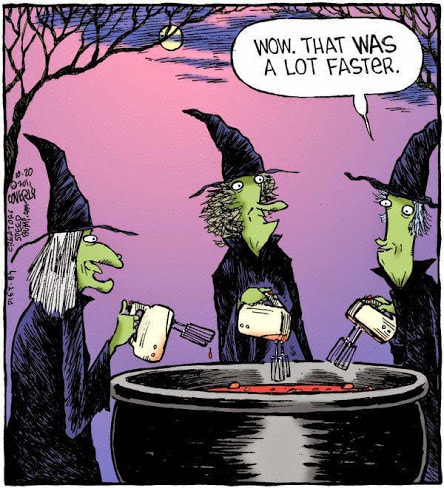Looking specifically at Samhain, during the Ninth Century, the Christian Church moved All Saint’s Day from May to November 1, probably in an effort to “Christianize” Samhain. The Church also (later) introduced All Soul’s Day on November 2, probably to provide a “Christian” holiday to supplant the practice of honoring one’s ancestors during the older festival. In any event, under the Church, these holidays became jointly known as Allhallowtide and included All Hallows’ Eve (October 31st, the eve of All Hallows), which is what eventually came to be called Halloween.
In any event, I enjoy Halloween, and I am, apparently, not alone as it is reported that it is second only to Christmas in terms of the amount of money spent on house decorations, parties, costumes, food, etc. Some “Christians,” of course, insist that Halloween is “the Devil’s Night,” ignoring the fact that it’s named for a Christian Church holiday, probably because the Church referred to is the Roman Catholic Church. (Note to the uninformed: The Roman Church WAS the Christian Church until the Protestant Reformation [1517 C.E., and after], but history doesn’t seem to be of much importance to some “believers.”) It may also be worth noting that some “reformers,” like my Salem ancestors, forbade the celebration of any “holidays,” including Christmas and Easter, as too “Popish” to be worthy of mention.
I don’t care. I like Halloween and have many fond memories of “trick or treating” as a child, hayrides, etc., as I got older, more “trick or treating” with my own kids, having costume-wearing kids (including, on occasion, some of my students) come to the door of our house, etc. I also think it’s fun to indulge in a bit of costumed horseplay and fantasy every so often. It seems unlikely to me that this is really going to hurt anyone very much, in spite of the “anti-Halloween” celebrations I have seen advertised by some groups.
In any event, I hope you have some fun this Halloween. Dig up a costume, have a party, indulge in some treats. Winter is coming with its dark days and long nights.
I saw this cartoon a while back and thought it very amusing, so I thought I’d include it:
Sam Hain
By Lord Fluff
Who is this guy they call Sam Hain?
I see his name in witchy books;
But when I ask my witchy friends;
They just give me the strangest looks.
He seems to be so important;
And everyone knows him but me;
Each year they throw him a party;
It sounds like THE cool place to be!
When I ask my friends what he’s like;
They all practically turn and run;
I need to get to know Sam Hain;
So I can join in all the fun!
I asked friends to introduce me;
I’ll have to introduce myself;
‘Cuz when I asked they looked at me;
As if I’m a demented elf!
So I searched the yellow pages;
I called up information too;
I just can’t find this guy Sam Hain;
I surfed the web ’til I turned blue!
I’ve heard my witchy friends planning;
And although they’ll think I’m a pain;
I’m going to crash his party;
Then I’ll finally meet Sam Hain!
Moving right along…
I see from my calendar that we have an election coming up pretty soon, so I want to remind everyone of the importance of voting (I hope everyone is registered).
You see, there is this rumor that we live in a democracy. That’s not really accurate. We live in a representative democracy, where we elect folks to vote for us as a group, rather than having to deal with of the clunky process of every person having to vote on every issue (a direct democracy). That, at least to me, makes the choice of who represents me of considerable importance, as I can’t be sure of exactly what the issues will be before I have my next chance to choose someone else to represent me.
As I do care about the issues of the day, in spite of trying to avoid discussing into them in this blog, I try to be careful to vote for people who seem to share my beliefs and ideas about the direction we should be going in the various governments in which I participate.
I’m not going to belabor the point, but it’s a bit like the lottery, if you don’t enter, you can’t win. I have no sympathy for folks who want to complain about the government, but who don’t even bother to make a decision as to who they want to represent them and follow through with casting their ballot in support of their choices.
So, VOTE already!
LLAP
P.S. I also think that the notion of acting to limit, restrict, or even just make difficult the right of other citizens to express their support for their choices is about the most “unamerican” idea that I have encountered.
P.P.S. I’m rather fond of this advice from Robert A. Heinlein regarding voting:
If you are part of a society that votes, then do so. There may be no candidates and no measures you want to vote for... but there are certain to be ones you want to vote against. In case of doubt, vote against. By this rule you will rarely go wrong. If this is too blind for your taste, consult some well-meaning fool (there is always one around) and ask his advice. Then vote the other way. This enables you to be a good citizen (if such is your wish) without spending the enormous amount of time on it that truly intelligent exercise of franchise requires.
However you do it, VOTE!

 RSS Feed
RSS Feed